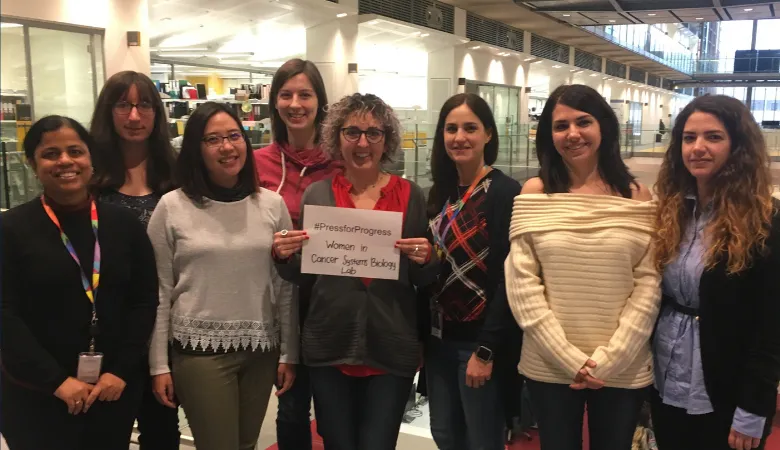08 March 2019
#WomenOfKings - Francesca Ciccarelli & Cancer Systems Biology lab
Celebrating and elevating King’s women for International Women's Day.

It's International Women's Day on Friday 8 March – a global day celebrating the social, economic, cultural and political achievements of women. This year's theme is Balance for Better, which calls for a more gender-balanced society. From the board room to the government, media coverage to employment, gender balance is essential for economies and communities to thrive.
To celebrate International Women's Day, we spoke to women from the Faculty of Life Science & Medicine King's about their careers, inspirations and what drives them.
"For the first time, female scientists are the majority in our lab"
Dr Francesca Ciccarelli is a Professor of Cancer Genomics in the School of Cancer & Pharmaceutical Sciences. The following female scientists from the Cancer Systems Biology lab are also featured:
- Lorena Benedetti, senior postdoc
- Lisa Dressler, second year PhD student
- Lizzy Foxall, postdoc
- Melissa Kartawinata, postdoc
- Trang Le, first year PhD student
- Lucia Montorsi, postdoc
- Dimitra Repana, second year clinical PhD student
What are you proudest of in your career?
Francesca: I am very proud to have the opportunity and the privilege to work with all these talented (female and male) scientists in my team! For the first time, female scientists are the majority in our lab and this is not usual considering that we use mostly computational approaches to study cancer biology.
Lorena: I am proud of being able to raise a child and keep my science projects moving forward. However, there’s still quite a lot to be done to support mother scientists!
Melissa: I am proud of the fact that I am contributing to cancer research and, eventually, I will contribute to find solutions to treat cancer and help patients.
Why did you decide to go into this field of study/research/work? What would you tell women who want to study in your field?
Lisa: The main reason I am interested in science is that I enjoy asking questions and finding answers. I would tell anyone who is interested in studying biological sciences – no matter if they are a woman or a man – that if they are curious, patient and persistent, they will probably enjoy it! I would also encourage them to take many opportunities to study/work abroad: it is a valuable experience and very rewarding, both professionally and personally!
Trang: My PhD project aims to apply machine learning to cancer research. I selected this project because I am interested in machine learning and would like to explore its application for the benefits of cancer patients. As a junior researcher, I am still exploring what it takes both intellectually and emotionally to have a good career and social/family life. So, for now, I would say to women who want to study in our field (and to myself…): stay passionate, confident and compassionate.
Melissa: I always liked biology and the idea to use technology to better understand biology. I became interested in cancer to understand how cells can escape cell death and proliferate indefinitely, in other words, become immortal… Because research is challenging field, I would tell people who want to do it: go for it if you have a true passion for science.
Who or what made you want to work in this field? How has your field changed since you started, and where do you see it going in the future?
Dimitra: As an oncologist, the biggest disappointment you face is not being able to offer effective treatments to all your patients. My motive to get involved in cancer genomics was to find new targets for the treatment of my patients. Research in this field is evolving rapidly also thanks to significant NHS investments such as the 100,000 Genomes Project and the recent promise by the government that millions of genomes will be sequenced in the next five years. We are certainly entering an exciting era of personalised care for cancer patients, and I am thrilled to be part of this, both as a clinician and as a researcher.
Melissa: I knew I wanted to work in science since I was a kid, but my PhD supervisor really amazed me with her passion in science and hence, the reason why I’m still here now.
